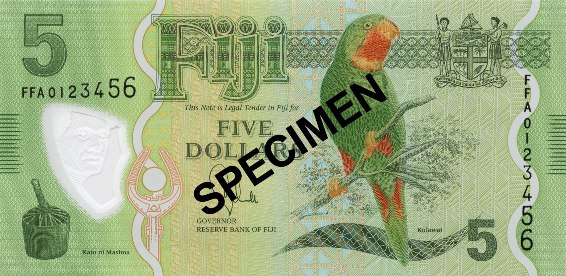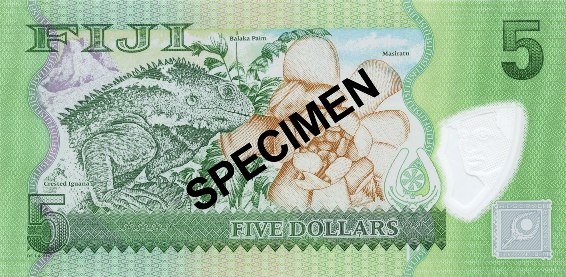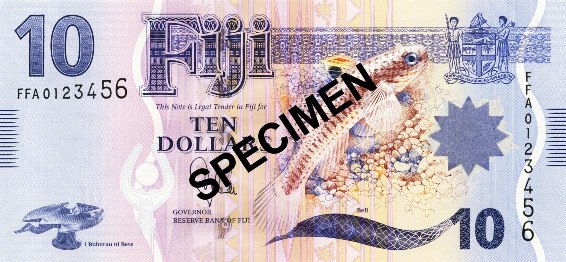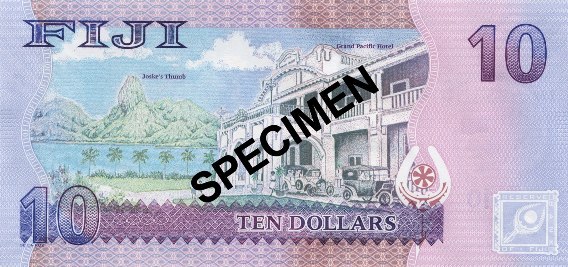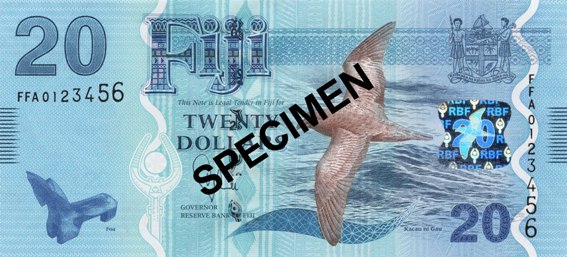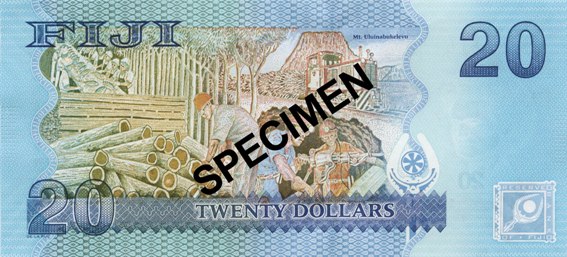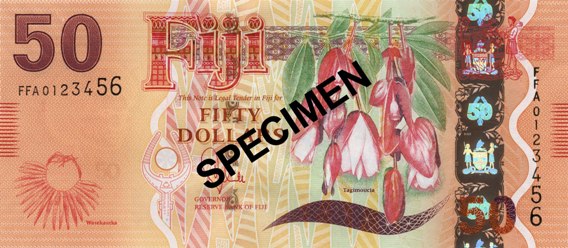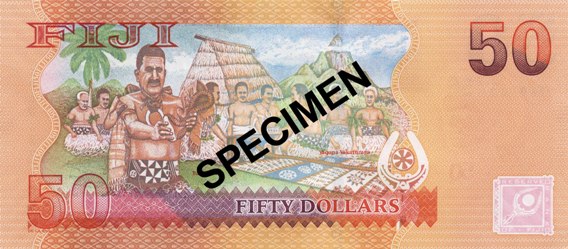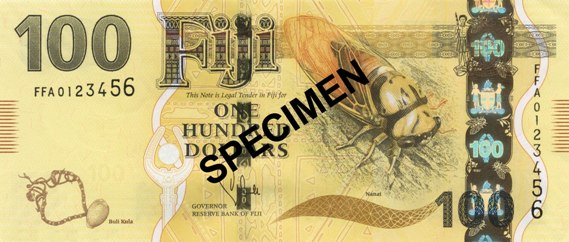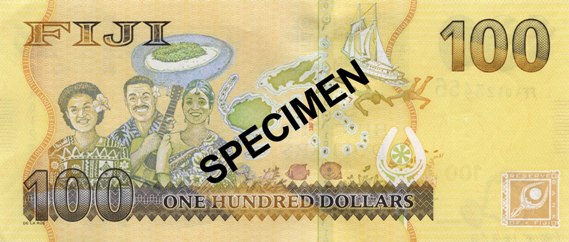 As announced Zambia issued new kwacha banknotes on 1 January 2013. Basically they kicked three zeros from their previous notes. This rebasing of their currency leaves with them K100, K50, K20, K10, K5 and K2 notes and coins for K1, 50 ngwee, 10 ngwee and 5 ngwee.
As announced Zambia issued new kwacha banknotes on 1 January 2013. Basically they kicked three zeros from their previous notes. This rebasing of their currency leaves with them K100, K50, K20, K10, K5 and K2 notes and coins for K1, 50 ngwee, 10 ngwee and 5 ngwee.
From 1 July 2013, the old currency will not be accepted anymore, but it will be exchangeable for a year thereafter for the new currency at the Bank of Zambia, commercial banks and designated agents. The new currency will get the symbol K. And what do the new notes look like? Click:
Update: sadly this rebasing of the kwacha has prompted some people to deceive others, particularly with the old and new K100 notes, as can be read in this article.
The old K100 banknote is a low value banknote and is now equivalent to 10 Ngwee in the redenominated banknotes while the new K100 banknote is equivalent to K100, 000 in the current family of banknotes.
 On 25 December 2012 the National Bank of Tajikistan introduced new 5 and 10 Somoni banknotes. The design is the same as the previous versions (P15 and P16) but in the new design a Kinegram stripe has been introduced on the front. The notes of 20, 50, 100, 200 and 500 Somoni already have a Kinegram stripe.
On 25 December 2012 the National Bank of Tajikistan introduced new 5 and 10 Somoni banknotes. The design is the same as the previous versions (P15 and P16) but in the new design a Kinegram stripe has been introduced on the front. The notes of 20, 50, 100, 200 and 500 Somoni already have a Kinegram stripe.
Unfortunately, the National Bank only has these two small images available but I'm looking for larger images.
You can read more about Kinegrams on this wikipedia site or in my list of security features.
 According to this article Angola will issue its first two banknotes of the new series in January 2013. This will be the 5000 and 10.000 kwanza notes. Angola currently has 2,000, 1,000, 100, 50, 10, and 5 kwanza banknotes in circulation. Governor José Massano of the National Bank said that authorisation for the new banknotes had been granted in June. Massano also noted that the decision to put more banknotes into circulation was due to the governments wish to popularise the use of the kwanza, which is used alongside the US dollar for transactions in Angola.
According to this article Angola will issue its first two banknotes of the new series in January 2013. This will be the 5000 and 10.000 kwanza notes. Angola currently has 2,000, 1,000, 100, 50, 10, and 5 kwanza banknotes in circulation. Governor José Massano of the National Bank said that authorisation for the new banknotes had been granted in June. Massano also noted that the decision to put more banknotes into circulation was due to the governments wish to popularise the use of the kwanza, which is used alongside the US dollar for transactions in Angola.
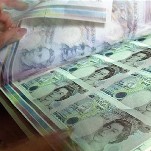 The Bank of England has released a list of 150 names put forward by the public with famous Britons to be considered for the new 10 Pound banknote. This note currently has an image of Charles Darwin on the back.
The Bank of England has released a list of 150 names put forward by the public with famous Britons to be considered for the new 10 Pound banknote. This note currently has an image of Charles Darwin on the back.
Some of the new names include David Beckham, Mick Jagger, The Beatles, Sir Winston Churchill and William Shakespeare. The most likely new face however is Second World War Enigma codebreaker Alan Turing who died in 1954. More than 25.000 people have signed an online petition calling for recognition of his achievements.
The complete list after the break:
Read More
Turkey has announced that new signature varieties will be issued on 24 December 2012. The new varieties will be for the 10, 20 and 100 Lira banknotes. The following signatures will be issued:
- 10 Lira: deputy governor Necati Sahin
- 20 Lira: deputy governor Murat Çetinkaya
- 100 Lira: deputy governor Necati Sahin
The new images will be:
 On 15 January 2013 Transnistria will issue new banknotes. The design will stay the same but the notes will have additional security features. One of these feautures will be a security thread. Also the date on the notes will be changed to 2012. More info can be found on this site (in Russian).
On 15 January 2013 Transnistria will issue new banknotes. The design will stay the same but the notes will have additional security features. One of these feautures will be a security thread. Also the date on the notes will be changed to 2012. More info can be found on this site (in Russian).
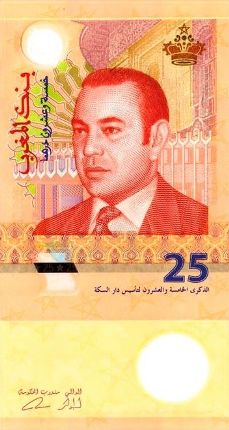
 With the issuance of the new Moroccan 25 Dirhams scheduled for this month, Bank al Maghrib, Morocco's central bank, will become the first in the world to issue a banknote printed on Durasafe. This is a new paper-polymer-paper composite produced by Fortress Paper at the Landqart mill.
With the issuance of the new Moroccan 25 Dirhams scheduled for this month, Bank al Maghrib, Morocco's central bank, will become the first in the world to issue a banknote printed on Durasafe. This is a new paper-polymer-paper composite produced by Fortress Paper at the Landqart mill.
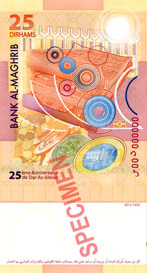 The front of the banknote features an Intaglio vignette and a watermark of King Mohammed VI, and a magenta/green colourshift security thread developed by the company's wholly owned subsidiary, Fortress Optical Features Ltd. The thread, like the watermark, is embedded inside the banknote yet visible behind a one-sided polymer window. It also has a fully transparent polymer window embossed with the King's royal crest. The back of the note carries a print vignette commemorating 25 years of banknote printing at the Moroccan State Printing Works, Dar As Sikkah.
The front of the banknote features an Intaglio vignette and a watermark of King Mohammed VI, and a magenta/green colourshift security thread developed by the company's wholly owned subsidiary, Fortress Optical Features Ltd. The thread, like the watermark, is embedded inside the banknote yet visible behind a one-sided polymer window. It also has a fully transparent polymer window embossed with the King's royal crest. The back of the note carries a print vignette commemorating 25 years of banknote printing at the Moroccan State Printing Works, Dar As Sikkah.
The windows in Durasafe are formed by die cutting each side of the three layer composite substrate separately. One sided windows (Viewsafe) give a clear view inside the substrate where the FOF thread and the watermark of King Mohammed VI are protected, but fully visible behind the polymer core. The transparent window (Thrusafe) is created by die-cutting both the outer paperlayers to reveal only the transparent polymer core.
 The Indonesian government has announced plans to reduce the number of zeros on the rupiah by three beginning in 2014. The redenomination will simplify payment processes in a national currency upon which many people already ignore the last three zeroes.
The Indonesian government has announced plans to reduce the number of zeros on the rupiah by three beginning in 2014. The redenomination will simplify payment processes in a national currency upon which many people already ignore the last three zeroes.
Source
 Jersey issued a very nice 100 Pound note in May 2012 in remembrance of the diamond jubilee of Queen Elizabeth II.
Jersey issued a very nice 100 Pound note in May 2012 in remembrance of the diamond jubilee of Queen Elizabeth II.
That note has now been nominated for two awards according to Businesslife.co: the International Association of Currency Affairs’ (IACA) Excellence in Currency Awards: Best New Banknote Award and the International Bank Note Society’s (IBNS) The Banknote of the Year Award.
The Excellence in Currency Awards were introduced by IACA in 2007 to promote and recognise excellence in currency issue, production, processing, management and distribution. The IBNS Banknote of the Year Award can only be entered if an IBNS member nominates a note and it is judged on artistic merit, imaginative designs, use of colour and modern security features. The winner will be featured on the IBNS website and the IBNS Journal which have a large international following.

 MRI reports the following: "According to local reports the governments of Curacao and Sint Maarten will decide next week whether to continue their monetary union. If they do decide to split, probably Sint Maarten will adopt the United States dollar."
MRI reports the following: "According to local reports the governments of Curacao and Sint Maarten will decide next week whether to continue their monetary union. If they do decide to split, probably Sint Maarten will adopt the United States dollar."
This discussion has been going back and forth the last few months. Have they finally made a decision?
 I already wrote about the tender which the Bank of England issued for the printing of the British banknotes from 2015 to 2029. Part of the new tender is a demand that the new printer is able to cope with changes from paper to polymer banknotes.
I already wrote about the tender which the Bank of England issued for the printing of the British banknotes from 2015 to 2029. Part of the new tender is a demand that the new printer is able to cope with changes from paper to polymer banknotes.
Does this mean that in the future the British pounds will be a polymer note? That will probably be the case for the lower denominations. Their lifespan is very short as a paper banknote. A polymer pound would last a lot longer.
Will the Bank switch completely to polymer? Only time will tell.
 Well, here’s a surprise nobody could see coming (yes, I’m using irony here).
Well, here’s a surprise nobody could see coming (yes, I’m using irony here).
An adviser to Libya’s Central Bank has said that although the Central Bank has worked for quite a while to issue a new paper currency, “the new currency had not been issued yet”. He said that images of the new currency published on social networking sites are not correct. He also indicated that the new currency would be issued at the end of the year, and will be traded in the market early in 2013.
I already wrote about this upcoming issue in this post in which I noted that the circulating images differ from the ones being shown in the video. I’ll still put my money on the ‘video notes’.
Update 8 January 2013: It appears like I was wrong with my predicition. Al Watan has published pictures of the new currency and they show the pictures which actually HAVE been been circulating in the social media. This publication has been copied by the MRI Bankers' Guide which gives the claim a lot of credibility.
The suspense is killing me! Just publish the official press release already...

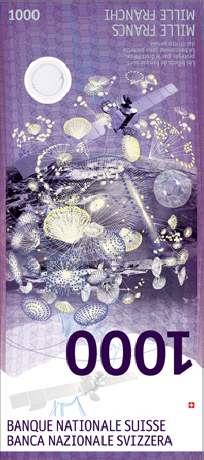
The Swiss National Bank has announced (PDF) that the new series of banknotes has again been delayed. The new series will be issued in 2015 at the earliest with the 50-francs banknote as the first banknote of the series and the 20-francs the second. From the press release:
The development of the new banknote series began in 2005 with a design competition. In the planning phase for the technical feasibility and during initial production tests in 2010, it became evident that the complexity of the new security features necessitated a postponement of the issue date to autumn 2012. In autumn 2011, during an early phase of the serial production, technical difficulties arose which had not been discernible in the testing phase, whose results were positive. For this reason, the SNB this year decided to conduct a comprehensive re-assessment of the entire project together with the industrial partners producing the new banknote on its behalf. As a result, several mostly technical measures were defined and in some cases have already been implemented. These measures should ensure that the series can go into long-term industrial production.
The decision to postpone has been made easier because of the high standard of security of the current series. About the design the SNB has previously (PDF) made the following remarks:
As mentioned in previous announcements, the new banknote series depicts Switzerland as a meeting place and platform for organisation, creativity, adventure, humanity, progress and dialogue. The current denominations of CHF 10, 20, 50, 100, 200 and 1,000 and the familiar colours of the individual denominations will remain unchanged, although the new notes will be slightly smaller than the current series.
The designer of the new banknotes is Manuela Pfrunder who entered the competition for the new design with this series of drafts. The final banknotes will differ however from these drafts. The final design will not be published until shortly before the issue date.
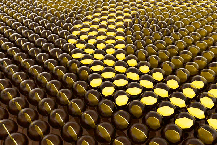 Banknote printer Giesecke & Devrient has developed a new (and pretty cool) security feature for banknotes. In the future you can check if a banknote is false using your mobile phone! It’s called MAGnite and will be introduced at the Banknote conference in Washington D.C. where the latest trends are introduced to the banknote industry.
Banknote printer Giesecke & Devrient has developed a new (and pretty cool) security feature for banknotes. In the future you can check if a banknote is false using your mobile phone! It’s called MAGnite and will be introduced at the Banknote conference in Washington D.C. where the latest trends are introduced to the banknote industry.
From their website: “
MAGnite uses high-performance pigments that allow reversible changes between two color states. Highly resistant micro capsules enclose these pigments, without in any way limiting their flexibility. The alignment of the pigments and the colors perceived can be controlled externally simply with magnetic effects.“
You can read more about it in
this article at the website of Giesecke & Devrient.
 Today Fiji announced the design for the new banknotes. Queen Elizabeth II has indeed been removed but not replaced by dictators or other people as some feared, but by birds, fish, flowers and an insect. The new currency will be issued to the public on 2 January 2013.
Today Fiji announced the design for the new banknotes. Queen Elizabeth II has indeed been removed but not replaced by dictators or other people as some feared, but by birds, fish, flowers and an insect. The new currency will be issued to the public on 2 January 2013.
The design of the new banknotes:
$5 Red-throated lorikeet (bird) – this will be a polymer note
$10 Lever’s goby (fish)
$20 The Fiji petrel (bird)
$50 Tagimoucia (flower)
$100 Cicada (insect)
Update: you can view the presentation of the new banknotes in this video, skip to 56:00 for the notes. I've finally managed to find decent high resolutuon pictures of the new banknotes. I think the design by De la Rue is beautiful!
« Vorige Pagina |
Toon berichten 871-885 van 937 |
Volgende Pagina »
 As announced Zambia issued new kwacha banknotes on 1 January 2013. Basically they kicked three zeros from their previous notes. This rebasing of their currency leaves with them K100, K50, K20, K10, K5 and K2 notes and coins for K1, 50 ngwee, 10 ngwee and 5 ngwee.
As announced Zambia issued new kwacha banknotes on 1 January 2013. Basically they kicked three zeros from their previous notes. This rebasing of their currency leaves with them K100, K50, K20, K10, K5 and K2 notes and coins for K1, 50 ngwee, 10 ngwee and 5 ngwee.
 On 25 December 2012 the
On 25 December 2012 the 

 According to
According to 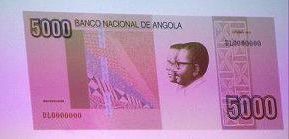
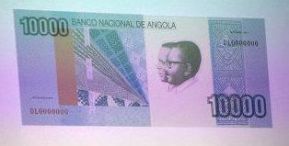
 The
The 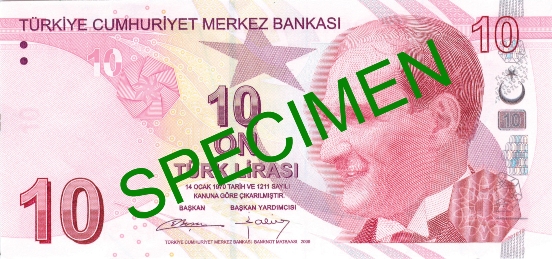
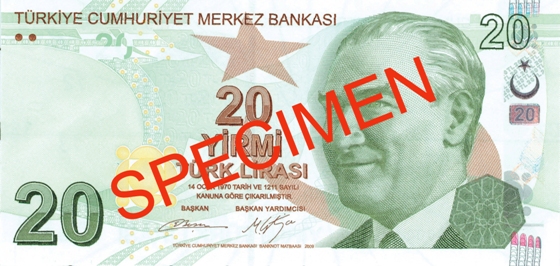
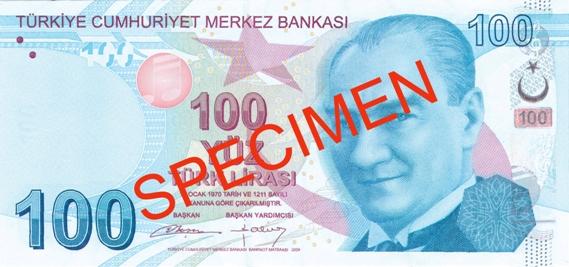
 On 15 January 2013 Transnistria will issue new banknotes. The design will stay the same but the notes will have additional security features. One of these feautures will be a
On 15 January 2013 Transnistria will issue new banknotes. The design will stay the same but the notes will have additional security features. One of these feautures will be a 
 With the issuance of the new Moroccan 25 Dirhams scheduled for this month,
With the issuance of the new Moroccan 25 Dirhams scheduled for this month,  The front of the banknote features an
The front of the banknote features an  The Indonesian government has announced plans to reduce the number of zeros on the rupiah by three beginning in 2014. The redenomination will simplify payment processes in a national currency upon which many people already ignore the last three zeroes.
The Indonesian government has announced plans to reduce the number of zeros on the rupiah by three beginning in 2014. The redenomination will simplify payment processes in a national currency upon which many people already ignore the last three zeroes. Jersey
Jersey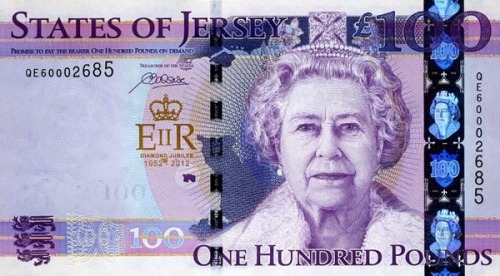

 MRI
MRI  Well, here’s a surprise nobody could see coming (yes, I’m using irony here).
Well, here’s a surprise nobody could see coming (yes, I’m using irony here). 

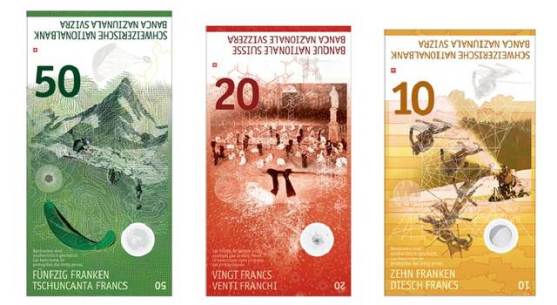

 Banknote printer
Banknote printer  Today Fiji announced the design for the new banknotes. Queen Elizabeth II has indeed been removed but not replaced by dictators or other people as
Today Fiji announced the design for the new banknotes. Queen Elizabeth II has indeed been removed but not replaced by dictators or other people as 